A Way of Being Free Read online
Page 2
It may be that what you could be haunts you. It is real. It is a weight you have to carry around. Each failure to become, to be, is a weight. Each state you could inhabit is a burden as heavy as any physical weight, but more so, because it weighs on your soul. It is the ghost of your possibilities hanging around your neck, an invisible albatross, potentials unknowingly murdered. The higher being you could be, if you could inhabit a higher state, also sits on you, increasing the tensions of your spirit, your moods, your irritations.
And so, feeling diminished, and having paradoxically gained a greater burden, you go to bed. But you don’t sleep immediately. Repressed faces, forgotten words, replies you failed to deliver in a split second to someone’s comment, dance round across your mind. In fact, that night you don’t sleep soundly at all. That is how in secret moments we repress and deny the poetic. That is how we murder our dreams. Then we carry the suppression of the poetic into our waking lives and wreak our vengeance on the world. Having avoided a self-confrontation, and being more pompous in our waking hours for the self-diminishment of our secret ones, that is how we become the antagonist of poets – enemies of the widening of the world towards a vaster, more wondrous reality. That is how we narrow the world’s sense of wonder. Antagonists of poets are among the life-haters, for whom Dante has a special place in a circle of the Inferno.
3
Poets sing for all the world in one breast. They sing for all those who need the unique nourishment of the poetic. Poets may choose to align themselves with the wretched and the voiceless of this planet. They may not. But they must draw to themselves heaven’s aid, for their calling is absorbing and demanding, rigorous as conscience and elusive as freedom. They could, if they choose (and their choice is dictated by the quality of their love) breathe unease on complacency, stir the meek against injustice, help the blind to see, and, to appropriate what Pascal said about the parables of Christ, blind those who can see. Where there is misery they might be moved to soothe, to rouse, to sing of revolt, to spread hope and deeper dreams of liberation.
‘For want of vision my people perish.’ People die not only from hunger and famine, they die also from spiritual undernourishment, spiritual kwashiorkor, spiritual AIDS. For at any given time and place there are many inner selves to feed and we do not have enough good poets to feed us. ‘There are many wand-bearers, but few inspired,’ Socrates said. The poets that could be better than good, whose words breathe gusts of incandescent and higher oxygen over the lands, wage an unending battle against the antagonists within and without. Few of these poets come through a lifetime’s struggle, their visions of hell, and can say in their works, like Homer’s Odysseus, and with that fearful Delphic clarity: ‘I have heard the songs of the sirens.’
Poets, be cunning. Learn some of the miracles. Survive. Weave your transformations in your life as well as in your work. Live. Stay alive. Don’t go under, don’t go mad, don’t let them define you, or confine you, or buy your silence. If they do confine you, burst out of their prisons with wilder fatidical songs. Be a counter-antagonist, break their anti-myths. Where the enemies breed destructions, sow seeds of startling lights. Keep sowing. Time will reap. Weave your songs by whatever means you can. ‘What doesn’t kill us makes us stronger,’ wrote Nietsche. There is no reason why the poet, if possessed of practical intelligence, cannot survive as well as the politician, or the banker. Don’t become a dying breed. Dare to stick around for the hard and beautiful harvest. We need you even as we antagonise you. Remember: it is from the strength of your antagonists that you derive your greater authority. They make it absolutely necessary for you to be more than yourself. Follow Melville’s precept, which he had nailed to his writing desk: ‘Be true to the dreams of thy youth.’ After your untimely and much lamented death, we would shout about how much we miss the uniqueness of your voice, your demanding presence, your duende. Don’t wait till you’re dead to know that in reality the whole of life is on your side.
Poet, be like the tortoise: bear the shell of the world and still manage to sing your transforming dithyrambs woven from our blood, our pain, our loves, our history, our joy. The lonely and inescapable truth simply is that this is the only kingdom you will ever have. This is the home of your song.
Creativity and the Minotaur
For Rosemary Clunie
Every true work of art is an enigma. But Picasso’s ‘Minotauromachy’ doubles its power by being an enigma about an enigma. This masterpiece of etching is a pure piece of visual paradox and symbolic prophecy. Executed in the thirties, during the atmosphere of gathering wars, it positively bristles with terror foreshadowed, with darkness already present.
The Minotaur is an old and deep figure in the consciousness of humanity. Out of the depths of our past, it has re-emerged on the stage of history. Half-man, half-bull, it dominates the landscape of this work, blocking out the light, cornering all the other figures. The Minotaur is no longer at the centre of the ancient Cretan labyrinth: it is in the centre of the picture, and the world stage. It has broken out of its lair. The Minotaur is the enigma at the heart of the modern age.
For Camus, the Minotaur is boredom – the boredom that devours the vitality of the young. For Picasso it is more sinister and complex. The Minotaur’s presence makes the world claustrophobic. Its brutish head is inescapable. Roles have been reversed: the Minotaur is striking back. Because we have failed to transform the animal within our labyrinth, the animal within is conquering us, unleashing vengeance.
The awesomeness of the Minotaur is reflected in the frenzied contortion of the horse and the murdered beauty on its back. The bearded man, who should be the defender, is seen fleeing up a ladder. The ladder leads nowhere. His backward-twisted head is the measure of his panic.
Only a little girl faces the Minotaur. She holds a candle aloft in one hand, and proffers flowers with the other. Her serenity is astonishing. The great Minotaur stares at her, sword pointed, but she isn’t really looking at him. Her eyes do not judge, her gaze seems to see beyond the horror. She doesn’t seem to see the spectre in front of her. She does not see the monster. She is not aware of the danger. Her gaze is gentle. Maybe she doesn’t see him as a monster. Maybe she sees him as a big, blind, unloved thing. Maybe the candle is there because she needs light to see by, to offer him flowers. Maybe it’s the symbol she offers, the light she shows, which really halts and confounds the enigma.
Might can always be greater than might: and violence would never have conquered the Minotaur. In a sense, the Minotaur cannot be conquered. It, too, is a part of life, of us, a part of life’s duality. The Minotaur, therefore, is not evil. Repellent, sad, a touch pathetic, and fascinating, it is an ambiguous figure. It represents something in us, something that has been ignored, or gone out of control. But when this irrational self bursts out, rampant, what recourse do we have? It is all in the girl, Picasso says, in the purity of heart and motive, in light, and in seeing clearly. This etching is part fairy-tale, asking us to believe in the power of symbols and the gentle triumph of wisdom and love.
How with this rage shall beauty hold a plea
Whose action is no stronger than a flower?
With the figure of that little girl Picasso answers Shakespeare’s anguished question.
We always need to be reminded of forgotten higher things. True artists are wiser than we think.
Newton’s Child
Perhaps we should strive towards mythical resonances in our lives. Among many possible images, a human being can be seen as a tree: we should reach out for more light even as we reach deeper into reality for a more solid hold on the earth. We were not born with one eye, with only one thought in our heads, and with only one direction to travel. When we look out on the world with all its multiplicity of astonishing phenomena, do we see that only one philosophy can contain, explain, and absorb everything? I think not. The universe will always be greater than us. Our mind therefore should be like Keats’ thoroughfare, through which all thoughts can wander. It should a
lso be a great cunning net that can catch the fishes of possibility.
Maybe our mind should be sensitive to the vastness that lies behind all reality, should be open to the winds and whispers of infinity, and should be able – by inkling and intuition – to enter the hidden realms of the blazing Tyger, the Robin, the Eagle, the Unicorn, and our mysterious humanity. How can we, in the presence of irreducible being, view life from only one perspective – the Cheetah’s, the Tyger’s or our own? We have the gift of overview, the tower of Imagination. We can place many perspectives side-by-side, we can even inhabit them simultaneously.
In art a complex experiment (if fully realised, and rendered as if natural) is but a sign of and a prayer to the greater glory and sublimity of our secret estate. It is a celebration of our terrestrial intelligence, our spiritual yearning, and the irrepressibility of our mischief and joy.
Better a complex mind behind a seemingly simple thought, than a simple mind behind a seemingly complex thought. The mind should surround what it expresses. Accidental perceptions can sometimes be profound, but it is always best to make the accidental perception into a leavening agent, to extend its radiance and influence throughout the texture of the work. There are few things worse than being exposed by the unabsorbed felicities of chance.
Thoughts solidly crafted like the artefacts of Haphaestus can shape the destiny of generations. Every artist has to be as much a shaper as a diviner. Artists carry their susceptibility to hidden illumination around with them. They go about with half-sight, partially in this world, partially in an invented one, their spine a divining rod, seeking attunement to the source of inspiration. And when a great thought twitches their soul, they have to hide, as if from lightning, and catch the inspiration on the wing, that it may not overwhelm them. Blessed are those who are overwhelmed, and who remember creatively.
Often ideas of great beauty come to us when we are most constrained. You might think there is a kind of perversity to inspiration. There might be. The subconscious loves mischief; its resident forces are trickster deities, Eshu, or Hermes, and other such figures who love tangents, invisibility, boundaries, and enigmas. The subconscious loves games; it is our own internal underworld of combinations, transformations, enchantments, and unfixed shapes.
Creativity, it would appear, should be approached in the spirit of play, of foreplay, of dalliance, doodling, messing around – and then, bit by bit, you somehow get deeper into the matter. But if you go in there with a businessman’s solemnity or the fanaticism of some artistic types you are likely to be rewarded with a stiff response, a joyless dribble, strained originality, ideas that come out all strapped up and strangled by too much effort.
The creative self has one side facing the dark waters, and the other side facing the bright and joyful firmament. Paradoxically, it flows into all things: and your spirit, in approaching it, should be able to flow into all things, all thoughts, all possible realities. Do not disdain the idle, strange, ordinary, nonsensical, or shocking thoughts which the mind throws up. Hold them. Look at them. Play with them. See where they lead. Every perception or possibility has its own life-span: some have short lives, others keep on growing, and many are open to infusions of greater life.
The artist should never lose the spirit of play. It is curious how sometimes the biggest tasks are best approached tangentially, with a smile in the soul. Much has been written about the seriousness with which important work has to be undertaken. I believe that seriousness and rigour are invaluable, and hard work indispensable – but I want to speak a little for the mysterious and humble might of a playful creative spirit. Playfulness lightens all terrifying endeavours. It humanises them, and brings them within the realm of childhood. The playfulness becomes absorbing, engrossing, all-consuming, serious even. The spirit warms. Memory burns brightly. The fires of intelligence blaze away, and self-consciousness evaporates. Then – wonderfully – the soul finds the sea; and the usually divided selves function, luminously, as one.
The play soon becomes its own sustenance. ‘I wonder how far I can take this?’ the smiling self asks. And the spirit of the encounter answers by taking leaps into the unknown, and creating terra firma for itself to land on. It answers by inventing roads where none exist, extending ones that do. In short, out of the place where playfulness and inspiration meet, come ideas and possibilities more astonishing, more solid, and more profound than can be pulled out of a solemn and sententious disposition.
It could well be that the wonders of literature and the marvels of the creative spirit are the offspring of the marriage between play and discipline, purpose, and mastery. An ideal creative genius would be one who knew how to consciously initiate great play, as well as how to harness great discipline, towards the most sublime endeavours.
If nothing else, if that height is beyond us, then at least a joyful creative attitude to life can transform the chore and boredom of work into perpetual delight, and introduce the hint of a blessed smile into the challenges of our days.
There is a touch of blessedness in the art of writing. It is sometimes interesting, while writing, to be occupied by the mood you want to render and to let the mood find the words. This assumes a oneness between you and your material, a quality of grace. But the mind often, in the midst of work, functions as its own infallible scanning sensibility, and can almost instantly find the words of the right colour, vibrancy, and tone. It is amazing how much of writing is a combination of mathematics and musical composition, of reason and aesthetics. It is also amazing how much of writing is rewriting; how much is instinctive; how much is simple logic, and the application of so many secret and invisible laws. Take, for example, the law of visuality – the words you actually see on the page. There is, to give another example, the law of the subliminal effect – words that you don’t notice but which make you see things more acutely.
Some writing is forceful, ambitious, and immediate; it is all there, it is sensual. Another kind of writing appears simple, does not add up to much on the page, and performs no somersaults. We think one kind of writing is better, but we are sometimes wrong, and sometimes right. When they work both kinds of writing are gifts, and both can be magical.
Some kinds of writing are commonly perceived as the best kind. Some are easier to praise. Some are easier to see. Some are easier to do. And some flatter the reader’s intelligence by eliciting clever responses from the clever use of their minds. But too often a lot of writing that impresses us at the time for some reason doesn’t go deep into our consciousness. The immediate response to a lot of supposedly good writing is usually more enthusiastic than the response evoked by the memory of it years later. It is sad how much that seemed fine shrinks in time. There is a sad mystery in it.
The best kinds of books, however, have a delightful mystery about them. They inexplicably create powerful feelings, images, moods, worlds, and parallel narratives the farther away in time you are from the reading. They grow in time. They keep re-creating themselves in your consciousness, they keep growing, keep becoming other books, till they become part of your experience, like something lived, or dreamed, or loved, or suffered.
Further encounters with such books make them more. There is no final point of understanding with books that live.
Their effects cannot be aspired to. And writers can never be altogether sure that they have indeed created this rare and living thing. For their mysterious effect can only be felt silently, in the secret chambers of consciousness, in the depths of sleep and forgetfulness, in states of being where the magic of the words can work unseen. This kind of writing keeps living through time, through generations, through stories people tell one another, through our solitudes and moods, and through the ways in which such books make us more creative as we live and change and grow – or even as we face the prospect of dying. These books do not belong to their authors. And so they cannot really take pride in them. They will never truly know the nature of their gifts. That is because these are gifts hurled out into time, hurled out
to future friends and affinities. If writers like that are our contemporaries we may never wholly recognise them, or realise what they will come to mean – for we do not inhabit the future; and if we have an inkling of what they are, then we are really waiting for them to die, for only then will the full nature of their splendid gifts begin to give off their eternal and natural light.
The highest kind of writing – which must not be confused with the most ambitious kind – belongs to the realm of grace. Talent is part of it, certainly; a thorough understanding of the secret laws, absolutely. But finding the subject and theme which is in perfect harmony with your deepest nature, your forgotten selves, your hidden dreams, and the full unresonated essence of your life – now that cannot be reached through searching, nor can it be stumbled upon through ambition. That sort of serendipity comes upon you on a lucky day. It may emerge even out of misfortune or defeat. You may happen upon it without realising that this is the work through which your whole life will sing. We should always be ready. We should always be humble. Creativity should always be a form of prayer.
You cannot write well when you have no feelings and no thoughts on the subject. Perhaps when we have to write to order the ill-used creative self, bored with the business of irrelevant and joyless tasks, will simply refuse to come alive when you really need it. You could call this the condition of developing faulty internal relations.

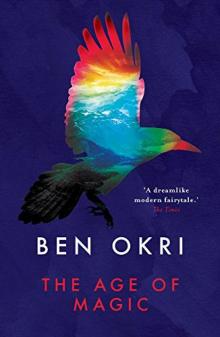 The Age of Magic
The Age of Magic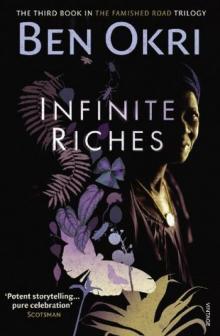 Infinite Riches
Infinite Riches Songs of Enchantment
Songs of Enchantment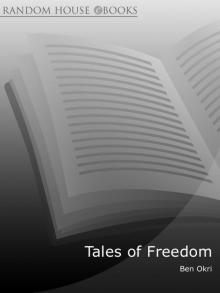 Tales of Freedom
Tales of Freedom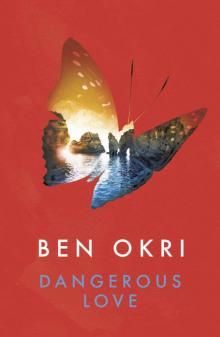 Dangerous Love
Dangerous Love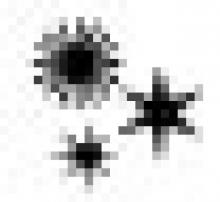 Starbook
Starbook The Famished Road
The Famished Road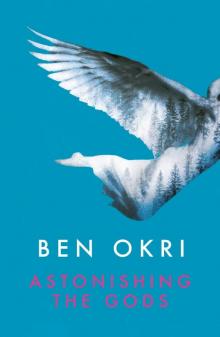 Astonishing the Gods
Astonishing the Gods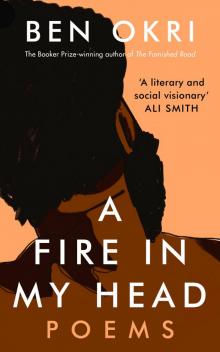 A Fire in My Head
A Fire in My Head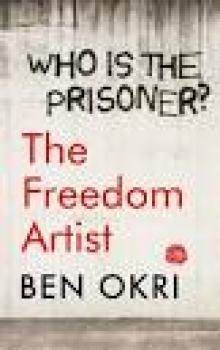 The Freedom Artist
The Freedom Artist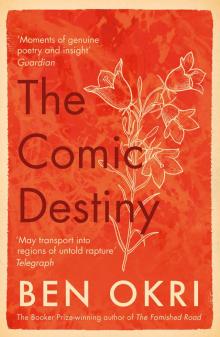 The Comic Destiny
The Comic Destiny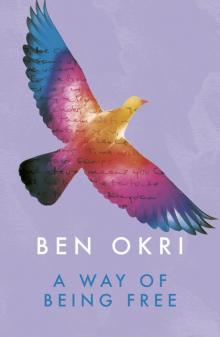 A Way of Being Free
A Way of Being Free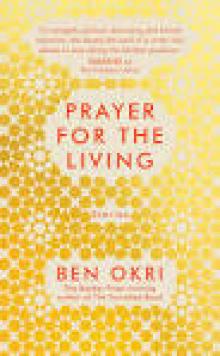 Prayer for the Living
Prayer for the Living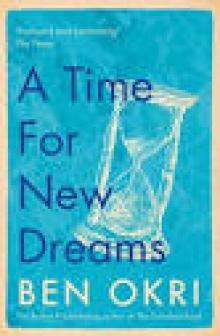 A Time for New Dreams
A Time for New Dreams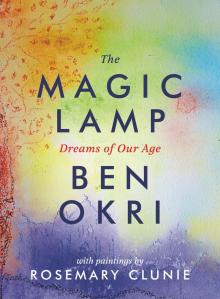 The Magic Lamp
The Magic Lamp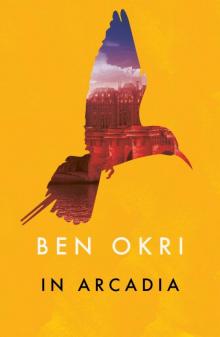 In Arcadia
In Arcadia